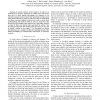Free Online Productivity Tools
i2Speak
i2Symbol
i2OCR
iTex2Img
iWeb2Print
iWeb2Shot
i2Type
iPdf2Split
iPdf2Merge
i2Bopomofo
i2Arabic
i2Style
i2Image
i2PDF
iLatex2Rtf
Sci2ools
CORR
2016
Springer
2016
Springer
Cognitive Architecture for Mutual Modelling
—In social robotics, robots needs to be able to be understood by humans. Especially in collaborative tasks where they have to share mutual knowledge. For instance, in an educative scenario, learners share their knowledge and they must adapt their behaviour in order to make sure they are understood by others. Learners display behaviours in order to show their understanding and teachers adapt in order to make sure that the learners’ knowledge is the required one. This ability requires a model of their own mental states perceived by others: “has the human understood that I(robot) need this object for the task or should I explain it once again ?” In this paper, we discuss the importance of a cognitive architecture enabling second-order Mutual Modelling for Human-Robot Interaction in educative contexts.
Related Content
| Added | 31 Mar 2016 |
| Updated | 31 Mar 2016 |
| Type | Journal |
| Year | 2016 |
| Where | CORR |
| Authors | Alexis Jacq, Wafa Johal, Pierre Dillenbourg, Ana Paiva |
Comments (0)

